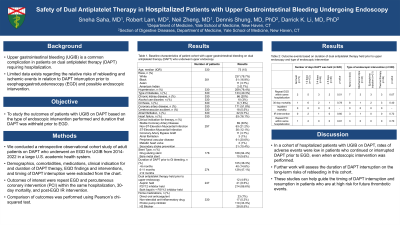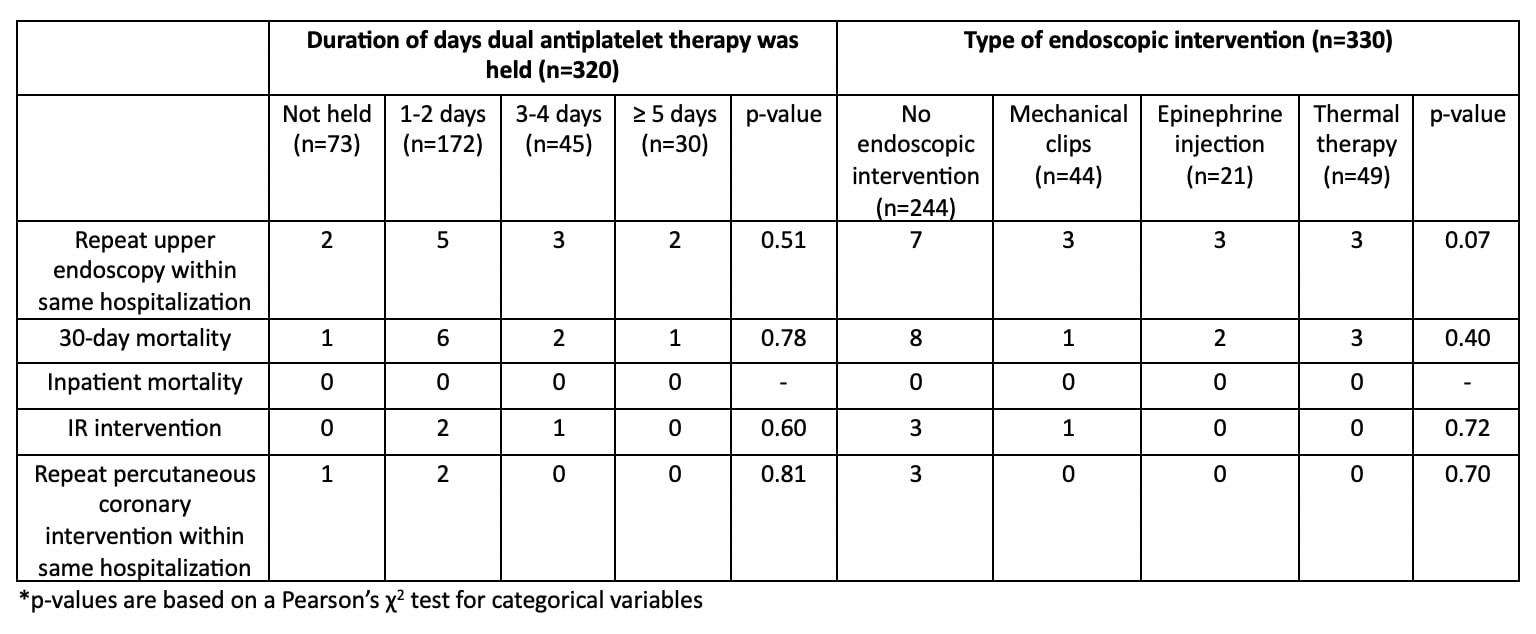Monday Poster Session
Category: GI Bleeding
P2443 - Safety of Dual Antiplatelet Therapy in Hospitalized Patients With Upper Gastrointestinal Bleeding Undergoing Endoscopy
Monday, October 28, 2024
10:30 AM - 4:00 PM ET
Location: Exhibit Hall E

Has Audio
- SS
Sneha Saha, MD
Yale University School of Medicine
New Haven, CT
Presenting Author(s)
Sneha Saha, MD1, Robert Lam, MD2, Neil Zheng, MD1, Dennis Shung, MD, PhD3, Darrick Li, MD, PhD4
1Yale University School of Medicine, New Haven, CT; 2Yale Digestive Diseases, New Haven, CT; 3Yale School of Medicine, New Haven, CT; 4Yale School of Medicine / Connecticut GI, New London, CT
Introduction: Upper gastrointestinal bleeding (UGIB) is a common complication in patients on dual antiplatelet therapy (DAPT) requiring hospitalization. Limited data exists regarding the relative risks of rebleeding and ischemic events in relation to DAPT interruption prior to an esophagogastroduodenoscopy (EGD) and possible endoscopic intervention. We studied the outcomes of patients with UGIB on DAPT based on the type of endoscopic intervention used and duration that DAPT was withheld prior to EGD.
Methods: We conducted a retrospective observational cohort study of adult patients on DAPT who underwent an EGD for UGIB from 2014-2022 in a large U.S. academic health system. Demographics, comorbidities, medications, clinical indication for and duration of DAPT therapy, EGD findings and interventions, and timing of DAPT interruption were extracted from the chart. Outcomes of interest were repeat EGD and percutaneous coronary intervention (PCI) within the same hospitalization, 30-day mortality, and post-EGD IR intervention. Comparison of outcomes was performed using Pearson’s chi-squared test.
Results: The study cohort consisted of 330 patients (median age 73). Medical comorbidities included hypertension (78%), coronary artery disease (52%), and type 2 diabetes (40%). Clinical indications for DAPT were stable CAD (30%), NSTEMI (21%), STEMI (12%), and peripheral vascular disease (21%). 47% of patients had been on DAPT for over one year while 38% of patients had been on DAPT for less than six months prior to UGIB. Peptic ulcers (37.6%) were the most common etiology of UGIB. 13 patients (3.9%) had a repeat EGD and 3 patients (0.9%) underwent repeat PCI within the same hospitalization. All cause 30-day mortality occurred in 12 patients (3.6%). Endoscopic intervention and duration of DAPT interruption were not significantly associated with difference in outcomes.
Discussion: In a cohort of hospitalized patients with UGIB on DAPT, both patients who continued or interrupted DAPT prior to EGD had low rates of adverse events even when endoscopic intervention was performed. Further work will assess the duration of DAPT interruption on the long-term risks of rebleeding in this cohort.

Note: The table for this abstract can be viewed in the ePoster Gallery section of the ACG 2024 ePoster Site or in The American Journal of Gastroenterology's abstract supplement issue, both of which will be available starting October 27, 2024.
Disclosures:
Sneha Saha, MD1, Robert Lam, MD2, Neil Zheng, MD1, Dennis Shung, MD, PhD3, Darrick Li, MD, PhD4. P2443 - Safety of Dual Antiplatelet Therapy in Hospitalized Patients With Upper Gastrointestinal Bleeding Undergoing Endoscopy, ACG 2024 Annual Scientific Meeting Abstracts. Philadelphia, PA: American College of Gastroenterology.
1Yale University School of Medicine, New Haven, CT; 2Yale Digestive Diseases, New Haven, CT; 3Yale School of Medicine, New Haven, CT; 4Yale School of Medicine / Connecticut GI, New London, CT
Introduction: Upper gastrointestinal bleeding (UGIB) is a common complication in patients on dual antiplatelet therapy (DAPT) requiring hospitalization. Limited data exists regarding the relative risks of rebleeding and ischemic events in relation to DAPT interruption prior to an esophagogastroduodenoscopy (EGD) and possible endoscopic intervention. We studied the outcomes of patients with UGIB on DAPT based on the type of endoscopic intervention used and duration that DAPT was withheld prior to EGD.
Methods: We conducted a retrospective observational cohort study of adult patients on DAPT who underwent an EGD for UGIB from 2014-2022 in a large U.S. academic health system. Demographics, comorbidities, medications, clinical indication for and duration of DAPT therapy, EGD findings and interventions, and timing of DAPT interruption were extracted from the chart. Outcomes of interest were repeat EGD and percutaneous coronary intervention (PCI) within the same hospitalization, 30-day mortality, and post-EGD IR intervention. Comparison of outcomes was performed using Pearson’s chi-squared test.
Results: The study cohort consisted of 330 patients (median age 73). Medical comorbidities included hypertension (78%), coronary artery disease (52%), and type 2 diabetes (40%). Clinical indications for DAPT were stable CAD (30%), NSTEMI (21%), STEMI (12%), and peripheral vascular disease (21%). 47% of patients had been on DAPT for over one year while 38% of patients had been on DAPT for less than six months prior to UGIB. Peptic ulcers (37.6%) were the most common etiology of UGIB. 13 patients (3.9%) had a repeat EGD and 3 patients (0.9%) underwent repeat PCI within the same hospitalization. All cause 30-day mortality occurred in 12 patients (3.6%). Endoscopic intervention and duration of DAPT interruption were not significantly associated with difference in outcomes.
Discussion: In a cohort of hospitalized patients with UGIB on DAPT, both patients who continued or interrupted DAPT prior to EGD had low rates of adverse events even when endoscopic intervention was performed. Further work will assess the duration of DAPT interruption on the long-term risks of rebleeding in this cohort.

Figure: Table A: Outcome events based on duration of dual antiplatelet therapy held prior to upper endoscopy and type of endoscopic intervention
Note: The table for this abstract can be viewed in the ePoster Gallery section of the ACG 2024 ePoster Site or in The American Journal of Gastroenterology's abstract supplement issue, both of which will be available starting October 27, 2024.
Disclosures:
Sneha Saha indicated no relevant financial relationships.
Robert Lam indicated no relevant financial relationships.
Neil Zheng indicated no relevant financial relationships.
Dennis Shung indicated no relevant financial relationships.
Darrick Li: Phathom Pharmaceuticals – Speakers Bureau.
Sneha Saha, MD1, Robert Lam, MD2, Neil Zheng, MD1, Dennis Shung, MD, PhD3, Darrick Li, MD, PhD4. P2443 - Safety of Dual Antiplatelet Therapy in Hospitalized Patients With Upper Gastrointestinal Bleeding Undergoing Endoscopy, ACG 2024 Annual Scientific Meeting Abstracts. Philadelphia, PA: American College of Gastroenterology.

